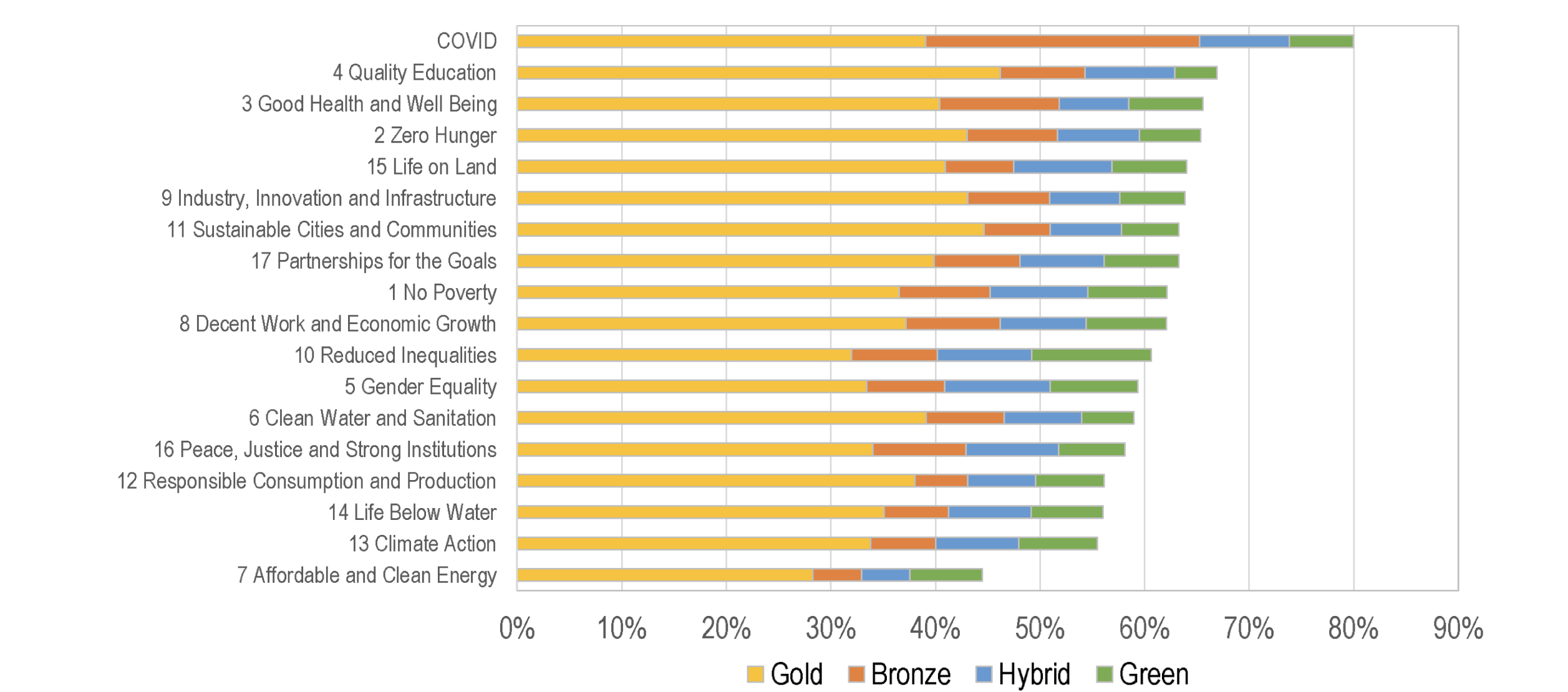The fundamental role that opening research plays in addressing the world’s greatest challenges was demonstrated during the pandemic. With 79% of research articles on COVID-19 openly available, many have concluded that “open access to COVID-19 research quickly became the new normal for biomedicine, with available findings directly impacting the development of treatment protocols and vaccines.”[1] Historically the open access (OA) community has advocated for OA across fields, however the emerging strategy of calling for research in particular critical fields, such as climate science, to be made openly available, holds much promise.
An approach that focuses on critical fields, or on solving specific issues through making research openly available, is also relevant for debates on access to data for training AI models. Much of the current debate adopts a position of advocating for “the more the better” approach aiming to secure openness of any data. However, this lacks purposefulness, and a critical fields approach supports the development of AI solutions that aim to fulfill specific societal goals.
In the early days of the outbreak of COVID-19, the Wellcome Trust and leaders from around the world called on researchers, journals and funders to make “all peer-reviewed research publications relevant to the outbreak immediately OA, or freely available at least for the duration of the outbreak.”[2] The scholarly communications community quickly responded, and as noted, 79% of research articles on COVID-19 were made OA. Following the end of the public health emergency in May 2023, only 12% of these articles have been removed from the PubMedCentral OpenAccess Subset and placed behind paywalls.[3]
During the pandemic, as we were witnessing policymakers and publishers responding to the call to make all COVID-19 research openly available, my former colleague, Frances Pinter, and I began a series of conversations around adapting this same model for another clear and present danger, climate change. Shockingly, 49% of research published on climate science is locked behind paywalls. Frances and I formed a steering committee, secured the partnership of Creative Commons, EIFL, and SPARC to lead the project, as well as seed funding from the Open Society Foundations, which led to a funding commitment from Arcadia to support the development of the Open Climate Campaign (OCC). The goal of the Open Climate Campaign is to promote open access to research to accelerate progress towards solving the climate crisis and preserving global biodiversity.
Strategies for OA in Critical Fields
Lessons from the OCC and using this approach can be instrumental to the global OA community. In particular, Monica Granados, the director of the OCC, has found that while the discipline-specific approach begins a conversation with policymakers around opening research on climate science and biodiversity, it provides an entry for a discussion of the development of OA policies for all research.
In addition to its work on policy development, the OCC experimented with several strategies for opening research, including:
- Unbinding published research articles;
- Developing a “Paper Pledge for the Planet”;
- Open Goes COP.
In 2004, Peter Suber, the godfather of the OA movement, and member of the OCC Steering Committee, introduced a new approach he called “Unbinding Knowledge.” Through this strategy “an authoritative scholar or organization could assemble a bibliography of the most important previously published research articles on a subject of urgent public need, such as the treatment and prevention of HIV/AIDS, then the journals publishing those articles might be persuaded to provide open access to them retroactively.” While widely discussed, this strategy has (to the best of Peter’s knowledge) yet to be deployed.
The OCC is the first effort of its kind, that I know of, to develop a critical field approach, and to bring to life the “Unbinding Knowledge” strategy. Given its structure focusing on particular subjects of special public-interest, the OCC decided to develop an unbinding project for climate science and biodiversity research articles. The campaign, working in partnership with the Curtin Open Knowledge Initiative and Sesame Open Science, analyzed articles cited in the Intergovernmental Panel on Climate Change (IPCC) Sixth Assessment Report (AR6) to determine their OA status. For those not openly available, the OCC is approaching the publishers to request that a special public-interest priority be given to opening the articles.
The public launch of the Unbinding project took place at the OASPA Conference in September 2024, with the OCC’s Rebecca Ross presenting an inspiring keynote. There was palpable energy following the presentation which led to a weighty Q&A period where many participants voiced their support and provided suggestions for other methods of reaching publishers and unbinding climate research. Notably, the librarians in the room showed an interest in collaborating directly with researchers, and the book publishers indicated a desire to join the initiative. Throughout the day, several publishers reached out to members of the OCC team to request their list of closed papers in the IPCC report and explore other ways of supporting the initiative.
Much of the OCC’s work has focused on outreach to the climate science and biodiversity research communities to generate support for opening research in their fields. However, as compared to the response to make research on COVID-19 openly available, the OCC is finding that OA is not yet on the radar of many scientists in the field. To help mobilize the community, the campaign is developing a “Paper Pledge for the Planet” to encourage researchers to make their articles OA. The aim is to use discovery services to identify related literature that was published in subscription-based journals, and then recruit copies of those articles to deposit into relevant institutional, domain, or generalist repositories. The OCC has partnered with the Share Your Paper service to provide support for authors in ensuring they have the rights to deposit and to provide an easy process for deposit of their author accepted manuscript. Researchers are encouraged to share a version of their paper in their institutional repository and the OCC’s Zenodo repository. To scale up this initiative, the campaign is also developing a collaboration with the Confederation of Open Access Repositories (COAR) to leverage COAR’s community power to identify and deposit climate change literature into the distributed repository network.
The Campaign has also focused its advocacy efforts on the world’s biggest climate change stage – the United Nations Framework Convention on Climate Change Conference of the Parties (COP). While many dimensions of climate change are discussed and negotiated at COP, the role of OA in solving climate change is not yet part of the discourse. Integrating OA in international climate agreements could exert powerful pressure on all actors in scholarly communication to make climate change research OA. The Campaign has partnered with the Open Knowledge Foundation, Open Data Charter and Wikigreen Initiative to launch the Open Goes COP coalition with the goal of raising awareness of OA at COP and integrating OA language into international climate agreements.
The OCC found that a critical field focus in climate research re-energized conversations around OA strategies and using a campaign framework allowed the project to better communicate a tangible value of OA in helping to find climate mitigations faster and more equitably. In its development of key messages, the OCC focused on distilling both a sense of urgency and a sense of optimism in that making climate research OA is something that we can do now to help mitigate the climate crisis.
Potential to Expand to Other Fields
Targeting the development of OA in specific fields can mobilize and educate communities. Beyond COVID-19 and climate research, one could think of this model being used in fields such as cancer research and uniting the public health community around OA to research on emerging infectious diseases, including drug-resistant infections. In addition, this approach could be applied to the Sustainable Development Goals, especially as just 56% of papers across the SDGs are OA.[4]

Graphic: Number of papers by SDG and for COVID-related research, by access type, 2017-2021. Vincent Larivière, Isabel Basson, Jocalyn P. Clark, bioRxiv 2023.05.18.541286; doi: https://doi.org/10.1101/2023.05.18.541286.
A critical-field-first approach has the potential to both strengthen and grow communities by supporting OA advocates to closely partner with activists and organizations working on these pressing issues. Since OA was defined in 2002, the community has been strengthened by the development of new strategies, and I believe advocating for OA in critical fields is another which ultimately supports the overall growth of the movement.
Footnotes
- Lane, Jacqueline N. and Hila Lifshitz-Assaf (2022). Brookings Institute. Dismantling the ivory tower’s knowledge boundaries.^
- Wellcome Trust (2020). Sharing research data and findings relevant to the novel coronavirus (COVID-19) outbreak.^
- PubMed Central. PMC COVID-19 Collection.^
- Larivière, Vincent, Isabel Basson, Jocalyn P. Clark (2023). Contrasting the open access dissemination of COVID-19 and SDG research.^





